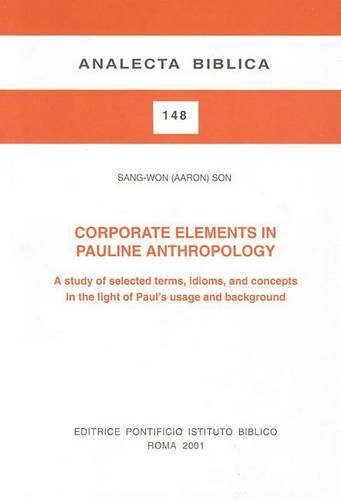Readings Newsletter
Become a Readings Member to make your shopping experience even easier.
Sign in or sign up for free!
You’re not far away from qualifying for FREE standard shipping within Australia
You’ve qualified for FREE standard shipping within Australia
The cart is loading…






Studio di Son Sang-Won Aaron. L'autore analizza questi elementi delle lettere di Paolo: la formula in Cristo, il suo paragone e contrasto tra Adamo e Cristo, il suo concetto della chiesa come corpo di Cristo e come tempio, causa ed edificio di Dio, e la sua comprensione dell'unione sessuale come una carne. Paolo comprende il Cristo risorto come una personalita corporativa. In this book the author, claiming that modern western biblical scholarship, greatly influenced by extreme individualism, has not paid due attention to the corporate dimension of Pauline anthropology, investigates the following elements in Paul’s letters in the light of his usage and background: (1) Paul’s in Christ formula, (2) his comparison and contrast of Adam and Christ, (3) his concept of the church as the body of Christ and (4) as the temple, house, and building of God, and (5) his understanding of the sexual union as one flesh. The author insists that these elements, closely interwoven in concept and realistic in expression, indicate that Paul understands the risen Christ as a corporate person in whom all believers are included and the church as a corporate solidarity inclusive of both Christ and believers. Underlying this concept is, the author argues, Paul’s assumption of the corporate solidarity of human existence. Paul views man not only as an individual but also as a corporate person whose existence extends in certain respects beyond his individual being to form corporate solidarity with others. This view of man both as an individual and corporate ‘ person, the author concludes, has significant implications for the rest of Pauline theology, particularly for his Christology, ecclesiology, and eschatology.
$9.00 standard shipping within Australia
FREE standard shipping within Australia for orders over $100.00
Express & International shipping calculated at checkout
Stock availability can be subject to change without notice. We recommend calling the shop or contacting our online team to check availability of low stock items. Please see our Shopping Online page for more details.
Studio di Son Sang-Won Aaron. L'autore analizza questi elementi delle lettere di Paolo: la formula in Cristo, il suo paragone e contrasto tra Adamo e Cristo, il suo concetto della chiesa come corpo di Cristo e come tempio, causa ed edificio di Dio, e la sua comprensione dell'unione sessuale come una carne. Paolo comprende il Cristo risorto come una personalita corporativa. In this book the author, claiming that modern western biblical scholarship, greatly influenced by extreme individualism, has not paid due attention to the corporate dimension of Pauline anthropology, investigates the following elements in Paul’s letters in the light of his usage and background: (1) Paul’s in Christ formula, (2) his comparison and contrast of Adam and Christ, (3) his concept of the church as the body of Christ and (4) as the temple, house, and building of God, and (5) his understanding of the sexual union as one flesh. The author insists that these elements, closely interwoven in concept and realistic in expression, indicate that Paul understands the risen Christ as a corporate person in whom all believers are included and the church as a corporate solidarity inclusive of both Christ and believers. Underlying this concept is, the author argues, Paul’s assumption of the corporate solidarity of human existence. Paul views man not only as an individual but also as a corporate person whose existence extends in certain respects beyond his individual being to form corporate solidarity with others. This view of man both as an individual and corporate ‘ person, the author concludes, has significant implications for the rest of Pauline theology, particularly for his Christology, ecclesiology, and eschatology.